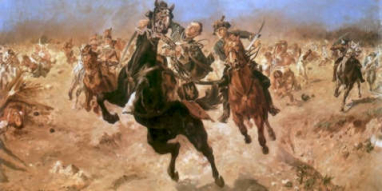Gen. Casimir Pulaski – patron saint
1747-1779
Casimir Pulaski
 Kazimierz Pulaski was born in Warsaw on March 4, 1745. Kazimierz was the seventh child in the family of Józef Pulaski and his second son. He spent his early childhood with his siblings in Winiary near Warka, and his first studies at the local school of theatine priests. In 1763. he stayed in Mitawa at the court of Prince Charles.
Kazimierz Pulaski was born in Warsaw on March 4, 1745. Kazimierz was the seventh child in the family of Józef Pulaski and his second son. He spent his early childhood with his siblings in Winiary near Warka, and his first studies at the local school of theatine priests. In 1763. he stayed in Mitawa at the court of Prince Charles.
February 29, 1768. in Bar in Podolia, the Bar Confederation, an armed union of Polish nobility in defense of civil liberties, national independence and the Catholic faith, was established. One of the initiators of this union and the first marshal of the troops was Joseph Pulaski. His sons followed their father’s example: Francis, Casimir and Anthony. In April of the same year, Kazimir fought his first victorious skirmish of several hours at Starokonstantinov, in Ukraine.
Soon after the siege of Berdyczow, he was taken prisoner. His freedom was returned to him in exchange for signing a document – a recession from the confederation. Pulaski had no intention of respecting the enforced commitment. Soon we see him in the Confederate ranks.
His battle route leads from the attempted capture of Lviv (1769) to battles in Lithuania, Podlasie and Mazovia. He is gaining more and more popularity among the confederated nobility, as evidenced by the granting of the dignity of marshal of the Land of Lomza. In the fall of 1789. and in the first half of 1770. Pulaski’s unit is experiencing a string of setbacks. Faced with them, the commander decides on a bold and tactically perfect step: in September 1770. occupies the Jasna Gora Monastery in Czestochowa. The victorious defense of Jasna Gora against the advancing Russian army brings sympathizers to the Bar Confederation. The seizure of the fortress also gave the confederates a permanent base from which it was convenient to penetrate Malopolska and organize expeditions against the enemy.
In the fall of 1771. In Warsaw, an attempt was made to kidnap Stanislaw August Poniatowski. Casimir Pulaski’s participation in the preparations for the coup was unquestionable. Thus, his continued stay in the country became impossible. In late May 1772. left Czestochowa in secret, leaving the last order to his comrades-in-arms.
“…I took a weapon in my hand for the public good, for it I must lay it down. The union of three powerful states subtracts from us all means of defense, and the affair into which I am enmeshed would make it difficult for me to carry out capitulation for you, linking you to my misfortune. I know your zeal and your courage, and I am sure that when happier circumstances happen to serve the Fatherland, you will be the same as you were with me…”
The period of defense of Jasna Gora brought Pulaski great fame and recognition not only in Poland. This was the second time he found his way into the pages of Bar poetry (the first time was written about after the Lithuanian expedition). Before July 23, 1777. will land overseas, lead a wandering life in Germany and France, spend six months in Turkey. In France, Pulaski came into contact with the historian and diplomat Claudius Rulhier, author of the work History of Anarchy in Poland. Pulaski became an indispensable source of information for him. While working on the book, Rulhiere introduces Pulaski to Benjamin Franklin – a plenipotentiary of the American Congress in Paris. This one supplies Pulaski with a letter of recommendation to Washington, writing, among other things:
 “…Count Pulaski of Poland, an officer famous throughout Europe for his courage and conduct during the defense of the freedom of his country, against the mighty powers: Russia, Austria and Prussia, will have the honor of delivering this letter to you. The court here encouraged him to make this trip and supported him in the belief that he could be highly useful in our service….” Thus opened an American chapter in the hero’s life. Almost as soon as he arrived, he showed up at Washington’s headquarters near Philadelphia. September 11, 1777. He took part in the Battle of Brandywine Creek in the state of Pennsylvania. September 15, 1777. received an appointment as brigadier general and commander of the U.S. Cavalry. Unprecedented courage and boldness
“…Count Pulaski of Poland, an officer famous throughout Europe for his courage and conduct during the defense of the freedom of his country, against the mighty powers: Russia, Austria and Prussia, will have the honor of delivering this letter to you. The court here encouraged him to make this trip and supported him in the belief that he could be highly useful in our service….” Thus opened an American chapter in the hero’s life. Almost as soon as he arrived, he showed up at Washington’s headquarters near Philadelphia. September 11, 1777. He took part in the Battle of Brandywine Creek in the state of Pennsylvania. September 15, 1777. received an appointment as brigadier general and commander of the U.S. Cavalry. Unprecedented courage and boldness
in decision-making gain him respect and recognition from his superiors. He fought bravely at Germantown, Pennsylvania, and at Haddonfielg, New Jesey. All of Pulaski’s efforts go into convincing Congress of the need to strengthen the cavalry. At the same time, with his usual zeal, he trains subordinate troops, solicits better equipment and food.
In March 1778. Pulaski received permission to form an independent cavalry legion. Soon, too, he attacks the U.S. Congress with another memorandum – seeking an increase in subsidies to an amount that would make the Legion a model unit in Washington’s army. These efforts end in failure: from Pulaski’s letters one can see loneliness and a deepening rift between him and those he wants to serve with heart and saber. He felt comfortable only in the whirlwind of battle. At the head of the legion, he fought battles at Little Egg Harbor, New Jersey, and later in the spring and summer of 1779. South Carolina, defending the city of Charleston.
October 9, 1779. Pulaski took part in the assault on the enemy redoubt at Savannah. Just minutes after the charge began, a bullet from an English cartridge reached him. Heavily injured, he was transferred to a ship. It took two days to grapple with death. On October 11, away from the shores, Pulaski died. His body, according to naval custom, was entrusted to the sea, although this is no longer so certain in light of recent research.
Casimir Pulaski is revered in the United States as a true champion of freedom. A historical-biographical museum in Warka is dedicated to commemorating Pulaski. October 13, 1979. A monument chiseled by Kazimierz Danielewicz was unveiled in this village.
Some states in the US (mainly Illinois, where the largest concentration of the American Polish community is located) celebrate Casimir Pulaski Day, a holiday commemorating Casimir Pulaski’s birth. According to a June 20, 1977 resolution, the first day of March is a state holiday. Street parades are organized then, and in many schools children have a day off from school. Pulaski’s birthday is also celebrated in the states of Wisconsin (a state holiday on March 4) and Indiana (Memorial Day).
In addition to this day, a federal holiday – General Pulaski Memorial Day – is observed across the United States to commemorate Pulaski’s death at the Battle of Savannah. The holiday falls on October 11, the anniversary of the general’s death.
Many streets, cities, foundations, geographic sites, schools and a Polish Sailing ship are named after Kazimierz Puaski. Pulaski has many monuments and plaques, and his beautiful place in American history for eternity.
